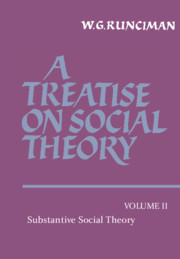4 - Social evolution
Published online by Cambridge University Press: 10 January 2011
Summary
PROCESSES OF CHANGE
§1. The fact that social evolution comes about through competitive selection of practices does not mean that the ‘great engines’ of human history – war, trade, religion, population growth, division and specialization of labour, and geographical and technological discovery – are any less important to it than they have traditionally been held to be. But it is because of their influence on the nature and degree of the advantages conferred by mutant or recombinant practices on their carriers that war, trade and the rest generate, sustain or dissolve modes and sub-types of the distribution of power. Indeed, their often contradictory effects cannot be fully explained unless these advantages are analyzed in detail. Wars sometimes promote and sometimes retard economic development; trade sometimes follows the flag and sometimes is followed by it; a new sacred or secular creed, or technique of production, or form of administrative organisation may displace or be displaced by pre-existing social-cum-ideological, economic, or political-cum-military institutions; and population growth has sometimes preceded, sometimes accompanied, and sometimes followed a change in the mode of the distribution of power. Which occurs, and why, depends on the institutional context within which war, trade and the rest promote new roles or modify old ones. The eventual outcome is contingent not only on the random events by which conflicts between contending factions, armies, classes, churches, status-groups, communities and nations are decided but also on the initial distribution of power when the conflict began.
- Type
- Chapter
- Information
- A Treatise on Social Theory , pp. 285 - 450Publisher: Cambridge University PressPrint publication year: 1989

